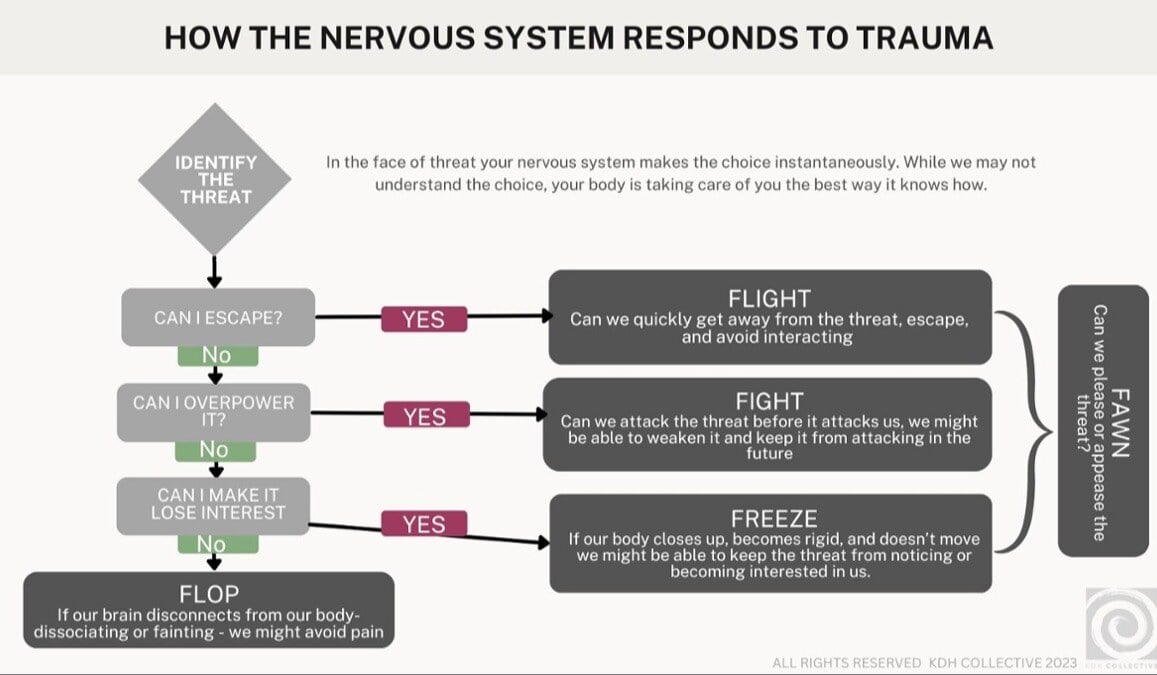Unraveling Trauma-Informed Therapy
Let's explore the impact of Trauma-Informed Therapy in addressing mental health issues and understanding trauma responses in relation to our client's...

Let's explore the impact of Trauma-Informed Therapy in addressing mental health issues and understanding trauma responses in relation to our client's presenting problems.
Trauma-informed therapy explains the connection between the nervous system and mental health, offering a paradigm shift in treating mental health issues. By delving deep into how trauma affects the nervous system, therapists can provide effective, nuanced treatment for individuals grappling with mental health challenges. This theoretical perspective is informed by biology and thus creates a non judgmental understanding of our clients mental health and why so many people have difficulty acting differently when they "know" the healthier way.
The nervous system is fundamental in regulating our emotions, behaviors, and responses to stressors. Trauma can cause significant dysregulation in the nervous system, manifesting in a spectrum of mental health symptoms that can severely impact an individual's quality of life.
For instance, traumatic experiences can lead to the development of anxiety disorders, depression, post-traumatic stress disorder (PTSD), and other mental health conditions. Trauma-informed therapy aims to empower clients with an understanding of the profound impact trauma has on their nervous system. It equips them with practical tools to regulate their emotional and physiological responses effectively.
Addressing this intersection of the nervous system and mental health, trauma-informed therapy offers a comprehensive, empathetic approach to fostering healing and recovery. This methodology appreciates the complexity of human psychology, ensuring treatments are tailored to address the multifaceted effects of trauma.
Trauma responses are innate, instinctual reactions to situations that are perceived as overwhelming or threatening. These responses, collectively known as the '5 F's' - Fight, Flight, Freeze, Fawn, and Flop, are automatic defense mechanisms that aim to protect the individual from perceived harm.
The 'Fight' response triggers when a person confronts a threat with aggression or direct confrontation. This response is powered by an adrenaline rush, preparing the individual to defend themselves actively.
Conversely, the 'Flight' response prompts an individual to escape or avoid the threat altogether. This response is driven by intense fear and an overwhelming urge to flee from danger.
The 'Freeze' response is characterized by a state of paralysis or inability to move or act, often occurring in individuals who have faced repeated trauma or abuse. This response represents a temporary shutdown of the body's ability to respond to the immediate threat.
The 'Fawn' response entails attempting to placate or appease the source of the threat through submission. This response is motivated by a desire to avoid further confrontation or harm by becoming agreeable or yielding.
Finally, the 'Flop' response manifests when an individual feels utterly defeated or powerless in facing a threat. This response is marked by a collapse of physical and emotional energy, rendering the person unable to fight or flee.
Gaining insight into these trauma responses is crucial within Trauma-Informed Therapy. It allows therapists to customize their therapeutic approach, addressing the unique needs and reactions of each individual. Recognizing and validating these responses empowers clients to understand their reactions to trauma biologically and thus finding solutions that are effective because they are biologically informed.
It's crucial to understand that the 5 Fs are complex, so we must stay open to accurately identifying what is truly happening.
In the therapeutic setting, acknowledging these diverse trauma responses paves the way for a more compassionate and effective treatment plan. It enables the therapist and the client to work together in identifying triggers and learning coping strategies that align with the client's natural response patterns. For example, someone with a predominant 'freeze' reaction might benefit from techniques that stimulate physical movement and grounding practices, aiding in re-establishing their sense of control and presence. Similarly, individuals who exhibit 'fawn' responses could be supported in establishing boundaries and asserting their needs. This tailored approach not only fosters a sense of safety and trust between the therapist and client but also encourages resilience and empowerment, ultimately contributing to a more successful healing process. Through this understanding, clients can begin to view their responses not as weaknesses but as strengths that have helped them to survive, but may no longer be needed.
Dissociation is a complex yet key component in Trauma-Informed Therapy, serving as a multifaceted response within the nervous system to trauma or overwhelming stress. This psychological mechanism is designed to help individuals detach from their immediate, intense traumatic experiences or overwhelming stress, acting essentially as a survival strategy to protect the individual's mental health.
In its less severe forms, dissociation can manifest as brief mental escapes, where the individual's mind momentarily transports to another place or time, offering a respite from stress or discomfort. Alternatively, it can present as depersonalization, a condition in which individuals feel an unsettling disconnection from themselves, as if they are an outsider observing their own life. Another manifestation is derealization, where the environment around the person seems unreal, contributing to a profound sense of disconnection from reality.
In more extreme cases, the impact of dissociation can lead to the development of Dissociative Identity Disorder (DID). This severe form of dissociation is characterized by the presence of two or more distinct identity states that the individual functions from at different times, creating significant memory lapses that interfere with daily life activities. These memory gaps go beyond typical forgetfulness and can affect personal relationships, work, and the individual's ability to function in society.
Therapists who are informed and trained in understanding the nuances of dissociation are better equipped to support their clients therapeutically. By identifying the signs of dissociation and understanding its profound impact on mental health, therapists can tailor their strategies to help individuals safely reconnect with their present experiences and emotions. An informed therapeutic approach allows for the acknowledgment and validation of the complexities of dissociation, enabling therapists to guide their clients through the process of healing. Through dedicated support and the development of effective coping skills, individuals can gradually rebuild a sense of wholeness, security, and well-being, ultimately leading to a more integrated and fulfilling life.
In trauma-informed therapy, it's paramount to thoroughly unpack and comprehend our clients' presenting problems. These problems, whether directly or indirectly related to their trauma, are the symptoms or issues that lead individuals to seek therapy.
Clients may come with a diverse array of presenting problems, such as profound anxiety, debilitating depression, substance abuse issues, tendencies toward self-harm, perfectionism, panic disorder, or difficulties in maintaining healthy relationships. These problems are informed by the client's nervous system and represent a reactive response.
By meticulously unpacking our clients' presenting problems, therapists can uncover our client's trauma history and its impact on their current lives. This method allows for the creation of a more effective treatment plan that emphasizes managing symptoms with biologically informed practices and connects one's trauma history to their present symptoms. Through this comprehensive approach, we can prepare our clients for future trauma processing, which will help mitigate the nervous system's automatic reactions to current symptoms.
Trauma-informed therapy leads clients to a deeper understanding of how their current issues connect to past traumas. This insight helps in cultivating effective coping strategies, enhancing therapy's effectiveness. By adopting this approach, therapy comprehensively addresses the client's entire experience, offering a clearer path through the intricacies of one's mental health.
Empowering clients through trauma-informed therapy also involves fostering a therapeutic environment that is rooted in safety, trustworthiness, transparency, support, collaboration, and empowerment. Creating a safe space where clients feel valued and understood is crucial for their healing process. This approach emphasizes the importance of giving clients control over their therapeutic journey, allowing them to set the pace and direction of therapy. It acknowledges the client's strengths and resilience, highlighting their capacity to overcome past adversities. This empowering perspective is instrumental in helping clients regain a sense of control over their lives, fostering resilience, and promoting long-term recovery.
Accountability plays an indispensable role in the success of trauma-informed therapy, serving as a cornerstone in its methodology. This therapeutic approach is fundamentally built upon a solid foundation of compassion and understanding. It emphasizes the importance of empathetically supporting our clients through their healing journeys. By creating an environment that is both nurturing and understanding, we pave the way for our clients to feel safe and validated in their experiences.
However, compassion does not stand alone in trauma-informed therapy. Alongside this supportive framework, a significant emphasis is also placed on the necessity of holding our clients accountable for their own changes. This is achieved through a multifaceted strategy that includes providing education on how the nervous system responds to trauma, thus empowering clients with the knowledge to understand their own reactions and triggers.
Furthermore, we actively engage in checking in on the practice of skills learned during therapy sessions in the time between appointments. This ongoing engagement is crucial for reinforcing the skills that our clients are developing. Additionally, we follow up on instances where a client may struggle to practice their skills, and provide solution focused support on problems solving how to overcome these barriers in the future.
This approach not only aids in the healing process but also empowers our clients to take active steps towards regaining control over their lives, thereby promoting resilience and a sense of agency.

Let's explore the impact of Trauma-Informed Therapy in addressing mental health issues and understanding trauma responses in relation to our client's...

Here’s a question to consider—Are you a therapist’s therapist? Do you advocate for other therapists, and do you offer beneficence when the...

One of the greatest pleasures I have in life are the friendships I've made along the way in my journey to becoming a therapist. For the most part,...